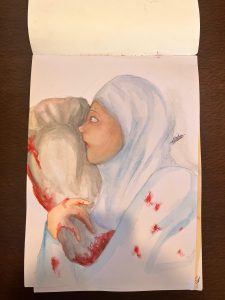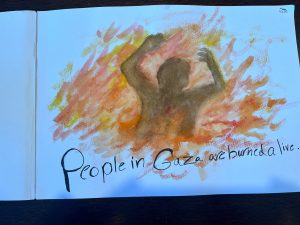From Gaza to Melbourne: Nirmaan’s story
As the much-welcomed ceasefire appears to be imminent in Gaza, the legacy of 15 months of conflict is a grave humanitarian crisis, urban destruction and the deaths of around 50,000 people.
Among the most egregious victims of the conflict are the women of Gaza and their children, who lived in inhuman conditions as war waged around them.
One of them, Nirmaan, arrived in Australia with her husband Eyad and their two daughters in May 2024.

Art pieces drawn by Nirmaan’s daughter
As hopes rise for a lasting peace in Gaza and Palestine, Nirmaan has shared her story with iMPACT Magazine.
“We just wanted our children to be safe,” she said.
She and her family managed to exit Gaza through Egypt.
“We paid $5,000 US per person to escape,” Nirmaan said.
She even sold some of her own jewellery to make sure her family could escape the war.
While still in Gaza, she experienced the horror of being a woman in a warzone.
“We moved into my dad’s home and after a week, our home was bombed,” Nirmaan said.
“How can a woman stay strong to take care of whatever family she has left?”
Nirmaan said women were denied necessities such as access to food, water, and sanitary products.
“Women live in tents. How can they survive? There is no place to cook, there is no bathroom, no privacy at all,” she said.
“There are no sanitary products for women and if you find any, they are very expensive.”
Being a mother of two girls, Nirmaan also had to make sure they were safe and as comfortable as possible, but it was not always easy.
“How can I make my children feel safe if I myself don’t feel safe?” she said.
“I hugged my kids all the time.”
Amongst the numerous buildings bombed, Nirmaan’s kids’ school was one of them.
“My daughter had terrible nightmares. Nowhere is safe in Gaza,” she said.
Other mothers shared the same sentiment of providing maximum protection to their children during the war.
Nirmaan remembers one of them.
“One woman said to me: ‘I did not eat anything; I gave the bread to my children’,” Nirmaan said.
Pregnant women also struggled in such harsh conditions.
“I remember a woman had to have a Caesarean and the doctor had to use his phone’s flashlight to perform the operation,” Nirmaan said.

Art pieces drawn by Nirmaan’s daughter
“Women cannot breastfeed because they have no food to eat. It is dangerous for both them and their babies.”
Nirmaan said everyday life presented multifaceted struggles, one being that people could not move freely.
“If you want to go to the West Bank, you have to take permission from the Israelis,” she said.
“If we were to say our whole story, we would need days, weeks,” said Nirmaan’s husband Eyad.
As the war continued, Nirmaan and her husband expressed a glimmer of hope for the future, saying that peace can be achieved, but not through any occupying forces and their tactics.
“Palestine is a land of peace. We have all different religions in our land who have lived together for centuries,” Eyad said.
For now, Nirmaan and her family are enjoying their new life in Australia.
Yet, survivor’s guilt remains.
“We feel guilty that we left and did not stay back to die,” Nirmaan mentions, reminiscing of everyone who lost their lives, relatives, and other Gazans,” Nirmaan said.
Her and her family’s new life is promising, most importantly for her girls, who have been forced, through no fault of their own, to experience a terrifying reality and get used to a new one.
Nirmaan and her husband do not want them to be suffering.
And while they can call Australia home now, Palestine is in their hearts.
– Katerina Hatzi












